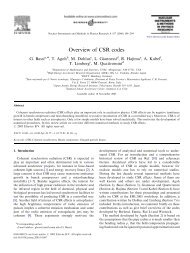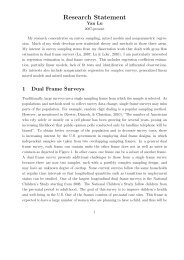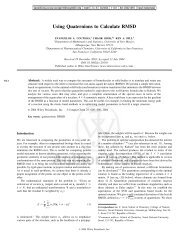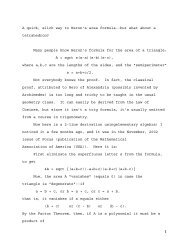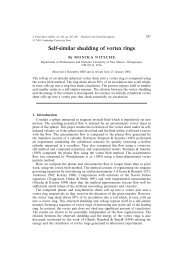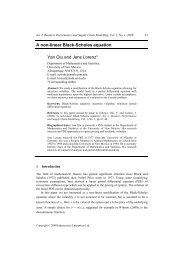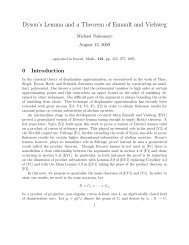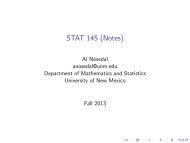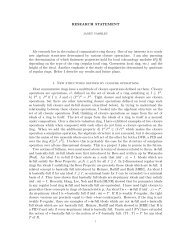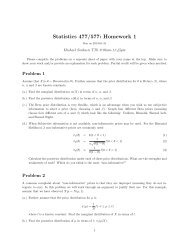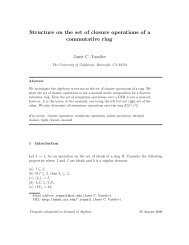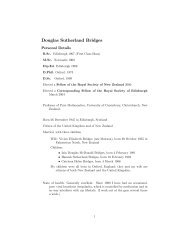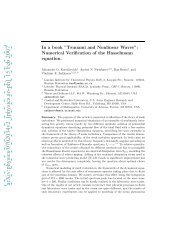OEO Office of Equal Opportunity - Department of Mathematics and ...
OEO Office of Equal Opportunity - Department of Mathematics and ...
OEO Office of Equal Opportunity - Department of Mathematics and ...
You also want an ePaper? Increase the reach of your titles
YUMPU automatically turns print PDFs into web optimized ePapers that Google loves.
136 ARTS AND SCIENCES<br />
3. Senior Program: after consultation with faculty advisor,<br />
choose 15 hours in courses numbered 300 <strong>and</strong> above:<br />
a. Twelve interdepartmental hours in courses centering<br />
around a particular topic or problem in American<br />
culture. Of the 12 hours required in this section <strong>and</strong><br />
the 30 hours required in 2 above (a total <strong>of</strong> 42), 18<br />
must be in American Studies. 12<br />
b. American Studies Seminar <strong>and</strong> Thesis (485) 3<br />
Total Hours 48<br />
A minor (18–26 hours in another department) is strongly<br />
recommended but not required.<br />
Minor Study Requirements<br />
An American Studies minor may be elected by undergraduate<br />
students majoring in the departments <strong>of</strong> Anthropology,<br />
Art History <strong>and</strong> Criticism, Economics, English, History,<br />
Philosophy, Political Science or Sociology. People having<br />
other majors will need the special approval <strong>of</strong> both their major<br />
advisor <strong>and</strong> the American Studies <strong>of</strong>fice.<br />
The minor in American Studies is designed to introduce<br />
students to the interdisciplinary study <strong>of</strong> the culture <strong>of</strong> the<br />
United States. The requirement is 24 hours, including 15<br />
hours in American Studies: 285, 3 hours at any level <strong>and</strong><br />
9 hours at the 300 level. Students will take the remaining 9<br />
hours in an integrated program chosen from other departments<br />
(Anthropology, Art History <strong>and</strong> criticism, Economics,<br />
English, Geography, History, Political Science, Philosophy,<br />
Psychology or Sociology) or American Studies courses. All <strong>of</strong><br />
these 9 hours must be from courses at the 200 level or above.<br />
With proper selection <strong>of</strong> courses a student may elect a minor<br />
in American Studies with an emphasis in African-American,<br />
Chicano, Native American or Women Studies. A student may<br />
choose to focus his or her minor program on other important<br />
themes in American culture, such as the popular arts or<br />
ecology in America, or may emphasize the interdisciplinary<br />
study <strong>of</strong> a region or the nation as a whole. All students should<br />
consult with their major advisor <strong>and</strong> the American Studies<br />
undergraduate advisor as early as possible to obtain approval<br />
<strong>of</strong> their minor programs.<br />
Major or Minor:<br />
Southwest Concentration<br />
The wealth <strong>of</strong> courses in various departments <strong>and</strong> colleges<br />
at the University <strong>of</strong> New Mexico dealing with the American<br />
Southwest <strong>and</strong> the Mexican Borderl<strong>and</strong>s supports this concentration.<br />
Recognizing the unique contributions <strong>of</strong> Southwest<br />
regional cultural development to the larger United States, the<br />
American Studies concentration in Southwest Cultural Studies<br />
provides undergraduates <strong>and</strong> graduates with an interdisciplinary<br />
program that is both structured <strong>and</strong> flexible.<br />
Major Concentration in<br />
Southwest Culture Studies includes:<br />
1. Requires American Studies 285, American Life <strong>and</strong><br />
Thought (3). 186, Introduction to Southwest Studies<br />
(3). Courses designed to provide an introduction to<br />
interdisciplinary methods <strong>and</strong> a context for Southwest<br />
Studies.<br />
2. Twenty-seven hours <strong>of</strong> Interdisciplinary Studies <strong>of</strong><br />
Southwest Culture: In consultation with the American<br />
Studies undergraduate advisor, the student will structure<br />
a coherent program <strong>of</strong> nine related courses<br />
selected from five general areas: History <strong>and</strong> Literature,<br />
Social <strong>and</strong> Cultural Systems, Political <strong>and</strong> Economic<br />
Studies, Arts <strong>and</strong> Humanities <strong>and</strong> Natural History.<br />
The major portion <strong>of</strong> this course work should center<br />
on a particular historical focus (Spanish Colonial, U.S.<br />
Territorial, Contemporary Southwest, etc.), ethnic or<br />
cultural experience (Chicano Experience, Southwest<br />
Native Americans) or specific geographical or environmental<br />
studies (The Ecology <strong>of</strong> Arid Climates, etc.). In<br />
all cases, students are encouraged to develop a broad<br />
comparative analysis (for example, a U.S. national<br />
cultural context or a Latin American context) or an<br />
extended chronological emphasis, not simply a concentration<br />
on a single narrow topic.<br />
3. Senior Program: After consultation with the American<br />
Studies undergraduate advisor, choose (from courses<br />
numbered 300 <strong>and</strong> above):<br />
a. Twelve interdepartmental hours in courses centered<br />
around a specific topic or problem in Southwest<br />
Cultural Studies. The theme <strong>of</strong> this final course<br />
work generally emerges from the previous broad<br />
sampling (section 2 above).<br />
b. American Studies Senior Seminar In U.S. Culture<br />
(485): A course in which the interdisciplinary implications<br />
<strong>of</strong> each student’s major topic are explored.<br />
Minor Concentration in<br />
Southwest Culture Studies<br />
This minor is designed to introduce students to the interdisciplinary<br />
study <strong>of</strong> the culture <strong>of</strong> the Southwest. Within the concentration,<br />
students may study the broad issue <strong>of</strong> Southwest<br />
Culture or focus on a specific area such as Native American<br />
Studies, Chicano Studies or cultural ecology. Hours requirements<br />
are identical with the minor specified above with the<br />
exception that the student must take American Studies 186,<br />
Introduction to Southwest Studies, as part <strong>of</strong> the 15 hours <strong>of</strong><br />
required American Studies courses.<br />
<strong>Department</strong>al Honors<br />
Students seeking departmental honors should apply to the<br />
American Studies undergraduate advisor in their junior year.<br />
In addition to maintaining a 3.20 overall grade point average,<br />
Honors c<strong>and</strong>idates must also successfully complete 3 credit<br />
hours <strong>of</strong> Senior Honors Thesis (499) <strong>and</strong> the American Studies<br />
Senior Seminar in U.S. Culture (485) in their senior year.<br />
Graduate Programs<br />
Graduate Advisor<br />
Varies, contact department <strong>of</strong>fice.<br />
Application Deadlines<br />
Annual: February 1.<br />
NOTE: Early application is recommended. No new<br />
applications will be accepted after February 1.<br />
Degrees Offered<br />
M.A. in American Studies<br />
Ph.D. in American Studies<br />
The <strong>Department</strong> <strong>of</strong> American Studies is committed to the<br />
interdisciplinary study <strong>of</strong> American culture <strong>and</strong> society as a<br />
whole. Besides general courses in American life <strong>and</strong> thought,<br />
six areas <strong>of</strong> special concentration are <strong>of</strong>fered: culture studies<br />
(including folklore <strong>and</strong> material culture); Southwest studies;<br />
environment, science <strong>and</strong> technology; popular culture; gender<br />
studies; race, class <strong>and</strong> ethnicity. Students consult with<br />
department faculty to develop individual, inter-departmental<br />
programs <strong>of</strong> study in the humanities <strong>and</strong> social sciences<br />
that focus on these or other significant aspects <strong>of</strong> American<br />
society <strong>and</strong> thought.<br />
UNM CATALOG 2006–2007 Symbols, page 611.



